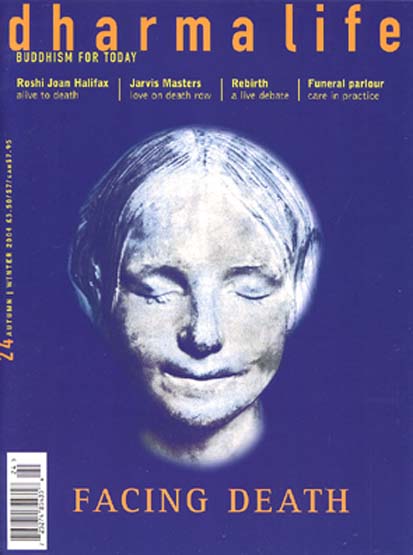Passing on
Roshi Philip Kapleau 1912-2004
When someone writes an account of the founding fathers (and a few mothers, too) of western Buddhism, Roshi Philip Kapleau's name will be among them. He was one of the first westerners to study Zen in Japan for an extended period and one of the first to return to the West to teach. Kapleau's book, The Three Pillars of Zen: Teaching, Practice and Enlightenment, was published just as another generation of disillusioned youths were looking to Asian spirituality for inspiration.
After a prolific career as a writer and teacher, Kapleau died on May 6, 2004 from complications of the Parkinson's disease that had affected him for a number of years. He died, his disciples reported, 'in the sunlit garden of the Rochester Zen Center in upstate New York, surrounded by his students, family, and friends'.
Kapleau was working as a court reporter at the Tokyo War Crimes Trials when he first encountered Zen. He returned home, but in 1953, aged 41 and disillusioned with life in post-war America, he went back and threw himself into Zen practice. He enrolled in a leading monastery before studying as a lay disciple under Yasutani Roshi. After two years he experienced the breakthrough of kensho in the private master-student encounter called dokusan with Yasutani: ''The Universe is one,'' Yasutani began, each word tearing into my mind like a bullet. 'The moon of Truth '' all at once the Roshi, the room, every single thing disappeared in a dazzling stream of illumination and I felt myself bathed in a delicious, unspeakable delight ... For a fleeting moment I was alone ... Then the Roshi swam into view. Our eyes met and flowed into each other, and we burst out laughing.'
Kapleau continued studying with Yasutani for seven years until, having completed his book, he felt it was time to return to America. With the help of a small group studying Asian thought in upstate New York he founded the Rochester Zen Center in 1966.
According to Kapleau's student Kenneth Kraft, 'a spiritual tidal wave then hit. The Three Pillars of Zen became a bible for the first generation of American Zen practitioners.' It was the first book by anyone, either western or eastern, to give an account of Zen training rather than its teaching; and its emphasis on the possibility of satori or Enlightenment had a profound impact. The book sold nearly a million copies and has been translated into a dozen languages.
Kapleau's subsequent career included its share of controversy. When he came to the West he decided to make the teaching more accessible by chanting sutras in English, and adapting names, robes and ceremonies to the new environment. Yasutani disapproved and Kapleau reluctantly withdrew as his disciple. He never received full 'Dharma transmission', and was effectively an independent teacher thereafter.
Kapleau and his disciples argued that real authority derives from the spiritual qualities they display, and according to one of them Kapleau 'has tenaciously preserved the spirit of Zen as passed on to him by his teachers'. However, Kapleau was criticised by those who believe that formal authorisation is a necessary qualification to teach.
Rochester Zen Center flourished under Kapleau's tutelage and it spawned a number of affiliate centres and groups. Although Kapleau wanted Rochester to be a celibate monastery, in fact its students were all lay practitioners. A number of them have become respected teachers in their own right, and activities have continued to develop since his semi-retirement in 1987.
Kapleau's greatest influence on the wider development of Buddhism dates back to the early days of its popularity in the West. His example and writings helped steer many spiritual seekers towards the practice, not just the theory of Zen.
As Kraft comments on his teacher, 'Kapleau's portrayal of Zen became the first model for many westerners. Whatever their reaction to that model, many readers found that Kapleau's presentation maintained a tenacious hold on their understanding of Zen.
'The Three Pillars of Zen has accordingly served as a benchmark against which other Zen books have been measured. It not only inspired many people to undertake Zen practice themselves; it also opened the door to Buddhist thought and spirituality for countless Buddhist readers.'
Vishvapani


